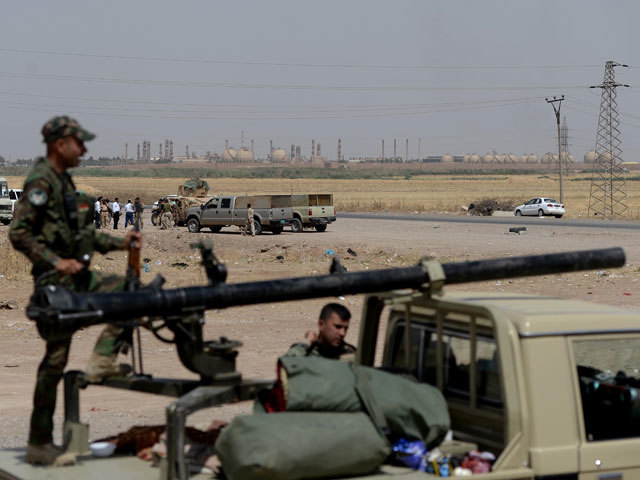
ISIS is making up for lost revenue from coalition strikes on its oil infrastructure by squeezing the population under its control through high taxes.
Experts believe its military defeat isn’t going to happen any time soon.
The Islamic State is believed to be maintaining a $2 billion empire according to new research from the Center for the Analysis of Terrorism, which releases a report today on the group’s finances.
Report authors, terrrorism experts Jean-Charles Brisard and Damien Martinez, conclude that “ISIS’s military defeat is not imminent… as things stand, ISIS economic collapse remains some way off in the mid-term,” CNN reported.
It says ISIS made $2.4 billion in 2015, around $500million drop from its estimated earnings in 2014, but ISIS remains the richest terrorist organization on the planet, due in large part to taxation.
Brisard acknowledged airstrikes have destroyed much of the Islamic State’s oil-producing infrastructure. But he said the only way to truly cut ISIS funding is to recapture the territory it controls.
The Islamic State’s “extortion” of the people living inside its territory in Iraq and Syria has increased from $360 million in 2014 to $800 million in 2015, according to researchers.
In recent months, ISIS has cut fighter salaries and the bombing campaign has cut its oil production.
ISIS still has about eight million people under its control, despite losing nearly half the territory it held, according to the US military, CNN said.
Brisard and Martinez say that ISIS has adjusted its business from oil to taxes. As oil fell from nearly half to quarter of its revenue in 2015, ISIS hiked taxes, which went from supplying 12% of yearly ISIS revenue to a third.
Those taxes include a 10% income tax, up to 15% business tax, road tolls, 5% fees for bank cash withdrawals, and up to 35% taxes on pharmaceutical drugs. There are also fees for leaving the territory, even temporarily. And there’s a special tax on Christians or “protection insurance” called jizyah.
ISIS says all taxes are zakat, Islamic religious alms similar to tithing.
“It’s really an adaptive organization,” Brisard told CNNMoney. “What strikes me is the fact that they’re clearly behaving as managers, not simple looters. They really have budget requirements, and they’re compensating.”
This latest estimates ISIS made $600 million from oil last year. The US Treasurypreviously estimated it’s closer to $500 million.
The Geneva Centre for Security Policy will publish a report next week that details how ISIS has come to rely on taxes to fund its terror.
Other experts believe ISIS is eyeing illicit profits from cybercrime as the next frontier and using digital currencies like Bitcoin, to make it harder to track.
The report by the Center for the Analysis of Terrorism claims ISIS still has huge trade with the outside world, because the United Nations has failed to close off its territory with a formal embargo, and American coalition airstrikes have limited impact on the economy.
ISIS is besieged on several sides by troops from the Russian-backed Syrian government, U.S.-backed Kurds and other rebel factions, but the United States and Russia have shown no indication they are willing to commit their own military forces.
What surprises Brisard the most, however, is that the countries sitting on the UN Security Council can’t agree to an embargo that punishes countries that continue buying cement, wheat, oil, phosphate and other products from ISIS territory.
For example, research estimates that ISIS sold 12,000 tons of cotton last year – mostly to buyers in Turkey.
“The current situation is absurd,” Brisard told CNN.